County Explores Offering New ID Card
Washtenaw County board of commissioners working session (Aug. 7, 2014): A proposal to establish a county-issued ID card program is being reviewed by the board of commissioners, who were briefed on the recommendations of a task force at their August working session.
A county identification card would allow residents who don’t have a driver’s license or other government-issued photo ID to access services that require that kind of identification, like renting an apartment or opening a bank account.
The proposal indicates that cards would cost $20 or $25 each, although a waiver might be available for people who can’t afford it. An estimated 1,000 cards would be issued in the first year through the voluntary program. Those revenues would help offset the operating costs, estimated at about $35,000 for the first year. The expenses would include funding for part-time staff at the county clerk’s office, which would administer the program.
Keta Cowan of the nonprofit Synod Community Services led the Aug. 7 presentation, outlining the work of the task force in comparing similar programs in other communities nationwide – although this would be the first ID card program offered by a Michigan municipality. The task force also conducted outreach to law enforcement agencies in the county, and Cowan indicated that they were supportive of the program. Sheriff Jerry Clayton is a task force member, along with several other county officials and nonprofit leaders.
Of the five commissioners who attended the working session, all but one indicated support for the program. Dan Smith (R-District 2) had concerns, and wondered why the county should spend money to duplicate a service that the Michigan Secretary of State already provides.
Task force members described the state’s ID program as being too stringent for residents who can’t meet the requirements, but who are living in this community and need access to services.
Conan Smith (D-District 9) described it as a basic human right. It didn’t matter to him whether someone is a legal resident or an undocumented resident – “if you need to live a decent quality of life and we can facilitate that with a simple ID card, great. We can and we should.” Smith also thought it would with access to voting, which he described as a citizen’s most fundamental right – the opportunity to shape their government.
Commissioners Rolland Sizemore Jr. (D-District 5), Andy LaBarre (D-District 7) and Yousef Rabhi (D-District 8) also indicated support for the program. Rabhi served on the task force that is bringing forward the ID card recommendations.
The board is expected to consider a formal resolution to establish an ID card program, likely at a meeting later this year.
The Aug. 7 working session also included a presentation on the public health department’s strategic plan. This report focuses only on the ID card program.
ID Card: Presentation
Yousef Rabhi (D-District 8) introduced the ID project presentation. He had represented the county board on the task force. About a year and a half ago, Keta Cowan and Janelle Fa’aola of Synod Community Services came to him to pitch the idea of an ID project. [Rabhi had first mentioned the project during a Feb. 6, 2013 county board meeting.]
The task force has been reviewing what other communities have done, Rabhi said, as well as the potential for what might be done in Washtenaw County. [.pdf of task force report]
In addition to Rabhi, task force members are:
- Jerry Clayton, Washtenaw County sheriff
- Catherine McClary, Washtenaw County treasurer
- Larry Kestenbaum, Washtenaw County clerk/register of deeds
- Melody Cox, Washtenaw County clerk/register of deeds assistant
- Keta Cowan, Synod Community Services (task force chair)
- Janelle Fa’aola, Synod Community Services (task force vice chair)
- Laura Sanders, Washtenaw Interfaith Coalition for Immigrant Rights
- Ellen Schulmeister, Shelter Association of Washtenaw County
- Charo Ledon, community organizer
- Sherrie Kossoudji, Law Enforcement Citizens Advisory Board
- Jason Eyster, Cooley Law School Immigration Law Clinic
- Irene Serrano, Community Conversations
- Martha Valadez, Community Conversations
- Ibrahem Irmy, Organizing for Action
Keta Cowan – CEO of Synod Community Services, a nonprofit based in Ypsilanti Township – began the presentation by showing a video that reviewed the reasons for implementing a county ID program. It would provide a way for residents who don’t have a driver’s license or other government-issued photo ID to access services that require such an identification card.
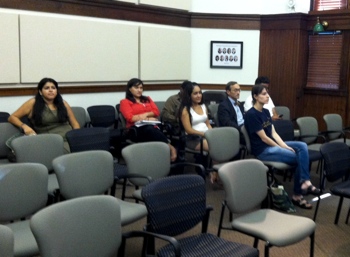
Members of an ID task force attended the Aug. 7, 2014 working session of the Washtenaw County board.
Actions and services that require a photo ID include renting an apartment, opening a bank account, and proving residency for things like library cards. People who are elderly, immigrants, ex-offenders, or homeless often face discrimination because they don’t have a photo ID. According to the task force report, having an ID is also important for law enforcement, because sometimes immigrants don’t feel comfortable reporting crimes – they fear repercussions if police ask for their ID.
An estimated 43,000 people in Washtenaw County lack ID, according to the task force, including 7,000 seniors, 11,000 African Americans and 5,000 undocumented residents.
Other communities across the country have already implemented local ID programs, including San Francisco and Oakland, Calif.; New Haven, Conn.; Mercer County, New Jersey; and New York City.
The task force is recommending that Washtenaw County establish an ID card available to all residents, and effective throughout the county. It would be administered through the county clerk’s office, and is projected to cost $20-$25 each. The cards would be completely voluntary.
There are human rights issues at stake when large numbers of people can’t access necessary goods and services, Cowan told commissioners. In addition, policing resources must now be spent identifying people who don’t have ID, she said. That means the community loses that police resource while an officer is taking an individual back to the station to get their information verified. “With a county ID, we could drastically minimize the waste of those policing resources, and provide a coordinated response to the problem of identifying folks in our community,” she said.
It’s in everyone’s interest to ensure that all residents have a safe and healthy community, Cowan said.
About two years ago, the task force began reviewing other jurisdictions that have already established an ID card, Cowan explained. Those communities provided a lot of advice and guidance on how to proceed. The advice included the importance of building a broad-based coalition and doing community outreach. So the Washtenaw County ID task force set out to meet with every law enforcement agency within the county, she said. Those groups shared the issue of tracking down ID as a diversion of police resources.
Cowan reported that the sheriff and police chiefs throughout the county support the ID program. They’ve committed to accepting the ID if other police jurisdictions accept it, she added, “and they’ve all indicated that they will.”

Keta Cowan, CEO of Synod Community Services, describes recommendations from a task force that’s been developing a Washtenaw County ID card program. (Photos by the writer.)
The front of the proposed ID card would be labeled “Washtenaw County Identification Card.” It would also state that the card is a “Michigan Picture Identification,” and not a license of any kind. The card would include a photo of the individual, their name and signature, taken on the day of their application. Other elements on the card are an ID number, date of issue and expiration, address, date of birth, height, weight and eye color. The security feature would be a “ghost image” of the person’s photo. The card would also include the Washtenaw County seal in the corner.
The card would have a magnetic strip that’s coded with the information on the card.
Applicants would apply for the card voluntarily through the county clerk’s office. An existing staff member from the clerk’s office would work part-time on the ID cards, accepting applications, verifying the identity and residency documents, and producing the ID card that same day.
In addition, for many residents who don’t have identity documents or who are mobility-impaired, the task force recommends establishing an “ID clinic.” It would be staffed by volunteers who’ll be trained in how to identify authentic residency and ID documents. There will be a 300-point system established to determine eligibility criteria, which must include at least one credential with a “biometric” feature – a photo or fingerprinting.
Janelle Fa’aola, task force vice chair, told commissioners that the goal of the ID clinic is to take some of the burden off of the county. The clinic would ensure that needs of vulnerable residents are met and that they are welcomed and supported, she said. The task force also is prepared to continue its community outreach efforts, forming partnerships with service agencies, law enforcement, government programs, and libraries. Outreach would also be conducted to local businesses that might provide discounts for ID-holders. [The task force has also started an online MoveOn.org petition to raise support for the ID card. As of Aug. 16, it had 529 signatures.]
Cowan reviewed a proposed itemized budget for the program. Washtenaw County’s one-time non-personnel costs are estimated at $23,285. An additional $8,190 in non-personnel costs would be paid by the community, Cowan said. County personnel costs – for a part-time staffer – would be an estimated $30,600 annually. Recurring non-personnel costs, primarily for supplies, would be $3,830. [.xls file of proposed budget]
In total, annual recurring costs would be an estimated $35,770.
Regarding the non-personnel costs, one item is the card printer for $9,000. This particular type of printer is recommended because it can produce security features to deter fraud and misuse, Cowan said, including security seals, ghosted photos, UV strips, and a digitized signature.
The ID card also represents a revenue opportunity, Cowan said. The task force estimates that about 1,000 cards would be distributed each year. That’s based on looking at cards that are issued in other communities – particularly Mercer County, which is about the same size as Washtenaw County, she noted. But it’s possible that more cards would be issued, she added.
If Washtenaw County charges $25 per card, the program could recoup most of the initial start-up costs, Cowan said. If more cards are issued, the revenue would obviously increase, she noted. “We believe the program would pay for itself.”
Cowan told commissioners that the task force spent considerable time working out the eligibility criteria for applicants. They developed a 300-point system, which includes the requirement of identity documents with a photo or fingerprinting. Applicants would have to show proof of residency, showing that they had lived in Washtenaw County for at least 15 out of the past 30 days. “We set it low so that we can encourage people to come and get a card as soon as they move,” Cowan said.
ID Card: Board Discussion
Dan Smith (R-District 2) began the discussion by saying he had several questions and concerns. He asked why the county should spend about $35,000 annually to duplicate a service that the Michigan Secretary of State already provides?
Keta Cowan replied that it’s not a duplication, because the state only provides an ID card “to a rigid, restricted group of people.” The state’s requirements are so stringent that some American citizens are not able to get identification cards, she said. And if you can’t show proof of legal residency in the country, you’re also not eligible, she noted.
In that case, Smith said, why wouldn’t the county lobby the Secretary of State, who is also an elected official with staff throughout the state, to make adjustments “to get rid of some of that [rigidness] that you claim exists?”
Cowan indicated they can pursue that approach. But meanwhile, there are individuals who lack access to necessary resources, she added.
Smith suggested that there’s probably a reason why some people can’t get state-issued ID cards. What’s been the response from the Secretary of State’s office?
The Secretary of State’s staff has said “that they can’t help us,” Cowan said. She gave two examples of residents who’ve been turned away, in one case because the man has dementia and can’t locate his identification documents.
Smith responded: “So you’re advocating that we put a less stringent process in place to make it easier for someone to get an ID than the state of Michigan, who has been in the ID business for decades.” He presumed the Secretary of State didn’t come up with its requirements “to be difficult.” There are legitimate reasons that the Secretary of State has for its processes and procedures, he said. So now, because the county doesn’t like those, they’ll just invent their own?
Jason Eyster, a task force member who works for the Cooley Law School Immigration Law Clinic, pointed out that for political reasons, the state determined that undocumented immigrants should not be allowed to get driver’s licenses. Even if those people have other valid forms of identification – such as a passport – they’re not allowed to get a state ID or state driver’s license, he said. Other states have decided to handle it in other ways, Eyster noted.
Smith asked why someone would need a county ID card, if they have a valid passport. Eyster said if the passport has expired, that wouldn’t be considered appropriate ID by many organizations and law enforcement. Smith questioned why the county would issue an ID based on an expired passport, when other entities don’t recognize that as a legitimate ID. Eyster replied that the goal is to determine “if this person is indeed who they say they are.” In the interest of human dignity and to assist those who live in our community, he added, it’s important to provide an ID so they can do things like rent a canoe, for example.
In the case of renting a canoe, Smith replied, that decision should be up to the city of Ann Arbor to change their policy regarding canoe rentals. The city is able to do that, and doesn’t need assistance from the county, he added. The same is true for other entities, like libraries and banks. “You’re trying to influence all these other policies throughout the county,” Smith said. Instead of developing a county ID, advocates should be lobbying other entities to change their policies.
Cowan responded, saying that the task force has done that type of community outreach. The response has been positive, she said. “If we institute a county ID, they would accept that.” Smith stressed that the county doesn’t need to “get in the middle of it.” The library, governed by a separate elected body, can make changes to its policies in any way it sees fit, for example. “They don’t need any assistance from us to alter their policies,” he said.
Eyster noted that they can continue to lobby each individual organization.
Smith thought that this problem is largely solved through the state’s ID card, and he wasn’t convinced the county should enact a new program. Regarding comparisons to other communities that offer ID cards, Smith noted that the ID program in New Jersey is a private venture, and the program in New Haven is operated by a city – there are no counties in Connecticut. And in California, counties are significantly more important than in Michigan because there’s no township structure there. So in the examples given by the task force, “none of them really bear any weight with me because there are completely different entities issuing the ID, as opposed to county government the way it exists in Michigan.”
Andy LaBarre (D-District 7) asked whether the county has authority from the state to do this – such as state enabling legislation or an attorney general opinion. Cowan replied that the county’s corporation counsel, Curtis Hedger, is researching that issue and will advise the board.
Yousef Rabhi (D-District 8) noted that there is no current state enabling legislation – but there’s also no legislation that would prevent it.
Conan Smith (D-District 9) said he took a different perspective on it “than the other commissioner Smith.” He thought that the county would be providing a public service – not just for the individuals who would receive the ID “as a very basic human right,” but also for entities like libraries, businesses and other organizations. Those groups shouldn’t have to figure out their ID parameters on their own, he said. It seems like people would be very grateful if the county provided that service.
It’s not the county’s role to solve the U.S. immigration policies, C. Smith said, but the county can help residents get access to services that require an ID – whether you’re a legal resident or an undocumented resident. “It doesn’t matter to me – if you need to live a decent quality of life and we can facilitate that with a simple ID card, great. We can and we should.”
Next to the dental clinic that the county is starting, C. Smith thought an ID card would be one of the best things that the board has accomplished. “It warms my heart that we’re even here at this point right now,” he said. He thanked the work of the task force, and looked forward to a formal proposal being brought to the board for approval.
Rabhi said he understood Dan Smith’s concerns. But responding to that, Rabhi added, when there are citizens in this community who are afraid to report a crime that they witness or that they’re the victim of, “that’s a problem.” When people can’t cash a check unless they go to a pawn shop, that’s a problem. If even a thousand residents in this community don’t have an ID, that’s a problem, he said. “I’m not going to wait for the Secretary of State to solve this problem, because in the last multiple decades, the Secretary of State hasn’t solved the problem,” he said.
It’s incumbent on the county to show leadership, Rabhi said. This isn’t a new concept, he noted. “We are acknowledging the humanity of people, and not pushing them to the side.” A lot of these people are taxpayers, he noted. He recalled a woman who’d come to a county board meeting asking for their help – she was a homeowner and her children were U.S. citizens, but she faced deportation. [He was referring to Ann Arbor resident Lourdes Salazar Bautista, who spoke at the board's Dec. 7, 2011 meeting.]
Homeowners and renters contribute to the local economy, Rabhi said. The taxes they pay come back to the county, city, library and schools, he noted. “They’re paying into a system that they can’t fully retrieve the benefits of, and that’s a lack of service to our taxpayers.” It’s a matter of equity, he said. Rabhi urged his fellow commissioners to support it.
Rolland Sizemore Jr. asked if any other communities in Michigan offer an ID card. No, Cowan replied. Rabhi noted that task force members met with representatives from Calhoun County, and he’s also fielded calls from Grand Rapids and Kent County – so there’s interest from other Michigan communities, he said. “There’s a lot of buzz in the state right now about it.”
Sizemore wondered what it cost law enforcement agencies to deal with people who don’t have a valid ID. Cowan said the task force hadn’t asked for that figure. Eyster noted that depending on the circumstances, someone without an ID could be arrested rather than just ticketed. An arrest would also require that a police officer or deputy notify the immigration & naturalization service (INS), and the person could be subject to deportation. So being pulled over for a broken taillight or other minor infraction has larger implications, he said.
Sizemore asked if everyone could afford a $25 fee for the card. If someone is homeless, $25 is a lot of money, he said. Cowan replied that the task force has considered instituting a waiver for people who are truly indigent.
Responding to other queries from Sizemore, Cowan said an applicant for the ID card would not be fingerprinted. It would only take a few minutes to process the application, and the card would be provided when the person applied. Sizemore also wanted to know more details about how the process would be protected from fraud.
Sizemore told the task force members that he planned to support their proposal. Washtenaw County takes pride in being a leader, he said. It would help make people feel more a part of this community, especially youth. Given the benefits, the county wouldn’t be spending a lot of money on this, he said.
LaBarre indicated that he’d likely support the program too. “From a cold-hearted business perspective, it would be good for commerce – and I say that half tongue-in-cheek, given where I work,” he quipped. [LaBarre is vice president of government relations for the Ann Arbor/Ypsilanti Regional Chamber of Commerce.]
Based on the experience of other communities, LaBarre said, what should the county be prepared for in terms of possible security problems? Other communities that the task force surveyed haven’t seen problems with the ID card, Cowan replied.
LaBarre said he was worried that even if the county puts this ID program in place, businesses and other entities might not accept the identification as valid. How can the county ensure that it’s effective?
Cowan explained that the majority of instances when an ID is required for businesses is for liquor purchases or in conjunction with the use of a credit card. The regulations issued by major credit card companies indicate that any government ID will suffice. For liquor stores, only state-issued or federal ID is acceptable, she said, “so our county ID would not be effective for the purchase of liquor.”
Responding to another question from LaBarre, Cowan said that local social service agencies and nonprofits have encouraged the task force to develop an ID program. Eyster pointed out that the task force has a responsibility to make sure that various organizations are educated about the program.
LaBarre said that if he were writing a headline to get attention, it would say something inflammatory, like “County Proposes Giving IDs to Illegals.” He imagined that if the program moves forward, the county will have to contend with rumor and hearsay. He wanted to make sure that they go into it with their eyes wide open in terms of all possible problems. Were there issues that other communities hadn’t anticipated when they launched their ID card programs?
Cowan reported that one community felt they hadn’t begun their community outreach early enough. Another community thought that they hadn’t built a coalition that was sufficiently broad-based. And one community hadn’t realized the balance of weighing access to the card against the need for having a reliable, reputable card that actually authenticates the identity of an applicant.
Eyster described the issue of undocumented immigrants as “incendiary.” He noted that the current issue about immigrant children coming from Central America is an example of that. There will be individuals who’ll take potshots or who vehemently feel it’s inappropriate, he said. LaBarre wanted the county to have an airtight case in terms of the program’s implementation, to make sure they’re prepared to deal with these issues.
Eyster noted that it’s important to remember the terrorists involved in the 9-11 attacks all had valid visas. LaBarre replied: “Something tells me that folks who will hit us on that issue will not listen to your point, but it’s worth saying.”
Rabhi said the ID program could be the start of a public-nonprofit partnership. The proposal isn’t for the county to go it alone, he noted. Community partners would help with outreach and education, and that’s built into the budget. That’s an investment that would help leverage the county’s investment, he said.
Conan Smith wanted to highlight the people who have lived in the United States for perhaps their whole lives who have problems getting an ID. With the proliferation of voter identification laws, it’s become a problem in exercising a citizen’s most fundamental right – the opportunity to shape their government, he said. It’s a problem that disproportionately impacts young people under the age of 25, poor people who are making less than $30,000 a year, and minorities. “We can help with that problem,” Smith said.
Cowan noted that the program provides an opportunity to do outreach into communities where people lack IDs, and who don’t know about the affidavit of identify. “All they know is that the signs say, ‘Take your ID to the polls,’” she said. “So if you don’t have an ID, you don’t go to the polls.”
The board is expected to consider a formal resolution to establish an ID card program, likely at a meeting later this year.
ID Card: Public Commentary
Two people spoke during the time for public commentary at the end of the working session.
Katia Salazar told commissioners that she’ll be a senior at Huron High School. She lives in Ann Arbor and is part of the Washtenaw Interfaith Coalition for Immigrant Rights. She supports the ID task force because every human deserves a form of identification to prove who they are. “We are all equal, and deserve to have the same equal rights as others,” she said. Having ID would also help prevent unnecessary deportations in the community, and it alleviates the fear that she or a family member could be deported. It also makes it less embarrassing to try to access services or resources like a library card. She hoped the county could get IDs for people who need them.
Ibrahem Irmy, a member of the ID task force, told commissioners that he’s a media analyst and preschool teacher. “I became a human being naturalized by the law three years ago.” He had lived in fear for a year before that, and couldn’t do normal things. He looked for ways to volunteer, but many organizations didn’t want him to help, because he didn’t have the documents for that. He’s now working with Organizing for Action to try to pass immigration reform, and he’s seen lots of people living in fear. They live on extremely low wages – $3 or $4 an hour – and live with 17 people in a room that doesn’t have space for even one person, he said. It’s about being a human being. Everyone is an immigrant, he noted. “We came here somehow, and we have human rights for all of us.” He hoped Washtenaw County would be the first county in Michigan to implement the ID program. He’d be willing to do anything to make that happen.
Present: Andy LaBarre, Yousef Rabhi, Rolland Sizemore Jr., Conan Smith, Dan Smith.
Absent: Felicia Brabec, Kent Martinez-Kratz, Ronnie Peterson, Alicia Ping.




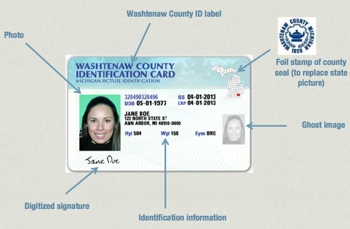

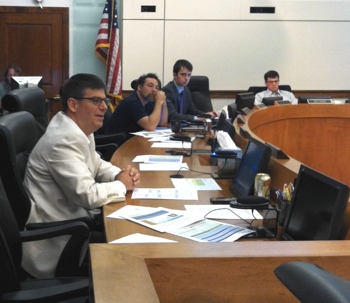
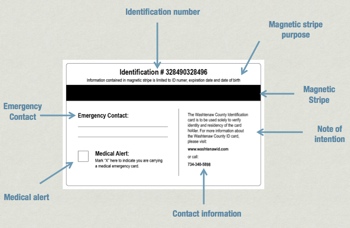
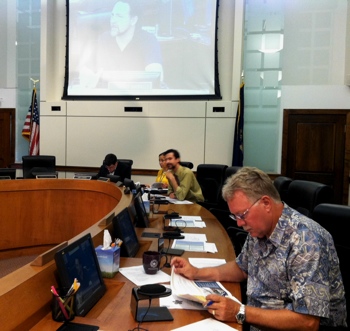
This is foolish. The state offers ID cards already, available at Sec. of State offices. A basic card is $10, an “enhanced” card is $30 (which gets you over the Canadian border without hassle.)
Using this as an opportunity to boost county revenues is a scam, and only takes advantage of the people they are claiming to help.
I wonder how many officials we could let go and save on their salaries if people just did their jobs and quit trying to figure out inane and preposterous ways to spend time on money on absolutely zero-benefit at BEST programs.
This is a perfect example of overstaffing and incompetence. What an absolutely idiotic concept.
Wouldn’t it be better if we eliminated some of the unnecessary ID requirements, like for voting?
Sorry Jim, I can’t agree, the incidents of 9/11 still weigh heavily on me — as Big Brother as it may seem, that is the world we live in.
A permanent ID issued with a Social Security number and digital information, for free, would be better. Forget photos. A file on the card could easily hold a blood or DNA scan, a retina scan, fingerprints — and last a lifetime.
Certainly not suggesting bar-codes tattooed on our arms, but we can do better — and it’s no secret that both Republicans and Democrats have stolen votes with phony voters when they can. And I don’t want to get on an airplane at Metro with someone who snuck over the border from Canada with a bomb in his/or/her socks.
Do the Washtenaw County Commissioners and all these task-force members have any important things to deal with? This is re-inventing the wheel, what a waste of time and money. This is a non-issue.
I am glad the Board of Commissioners is moving ahead with this badly-needed and inexpensive program.